|
By Tim Whewell, BBC News
BBC Newsworld
Friday, Mar 27, 2015
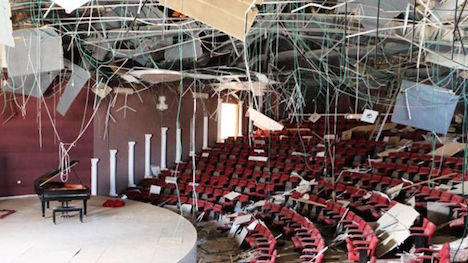 |
| Gaza's only Grand Piano |
The only concert grand piano in war-ravaged Gaza has been rediscovered and brought back to life after years of neglect. It survived last year's war with Israel - though only just - but was unplayable until a restorer arrived on a special mission from France, and paved the way for a rare concert.
When my eyes got used to the gloom of the Nawras Theatre in northern Gaza, I gasped at the scale of the destruction.
A tangle of cables, twisted metal and broken lamps hung down like spilled entrails from the shattered ceiling. The luxurious scarlet seats were littered with crumbled plasterboard.
The theatre - one of very few in Gaza - had been expensively refurbished just months before a rocket landed a few metres away during last summer's war with Israel.
But then, in the middle of the wreckage, I got my first glimpse of a greater treasure that, almost miraculously, had survived unscathed. On the cracked marble of the stage, dusty but intact, stood a concert grand piano - the only one in Gaza.
 |
| Claire Bertrand testing piano |
That's what Claire Bertrand, a young French music technician, and I had travelled to find. But Claire isn't one to stand and gawp. She marched up to the piano, flung up the lid and gazed in horror at the rusty strings inside. She tapped - or, rather, crunched - a few keys and listened to the grating notes.
"This is not a piano!" she muttered. "Everything is dead."
There's disagreement about how exactly the instrument got there. It's a Yamaha, and it's believed to have come from Japan. But was it, as some say, an official gift from the Japanese government to the Palestinian Authority? Or was it, as others imagine, an instrument brought by a Japanese diplomat for his daughter to play, and left behind?
All that's certain is that it ended up in the late 1990s in the Nawras Theatre. Once, before the piano came, the theatre hosted shows featuring music, comedy, even satire - but with the gradual worsening of the conflict around Gaza, and a steady growth of conservatism in local society, such performances became a thing of the past. After the Islamist militant movement, Hamas, took over the Gaza Strip in 2007, live music events became even rarer. The piano was stored out of sight, largely forgotten and uncared-for, until, two years ago, it was rediscovered by Khamis Abu Shaaban, the administrator of Gaza's music school, and Lukas Pairon, the founder of the Brussels-based charity, Music Fund, which sends instruments to Gaza and other places around the world where they are needed, and trains local people to repair them.
They were drawing up an inventory of all Gaza's pianos. Abu Shaaban heard a rumour there was one at the Nawras, but assumed it was an upright. They were astonished to find a grand. And even more astonished - when war broke out several months later - that the piano survived intact, despite the wreckage that fell all around it.
The restoration project was organised by Music Fund and financed by the conductor and piano virtuoso Daniel Barenboim, who gave a concert in Gaza four years ago. "Gaza is not only rockets and missiles and angry people," Barenboim tells me. "The fact that the grand piano will be there - and restored and playable - will give the Gazans the possibility, as soon as life permits it, to have some kind of cultural activities… They need to hear really good music."
For the restorer, Claire Bertrand, who volunteered to come to Gaza on her first foreign assignment, it was a big job.
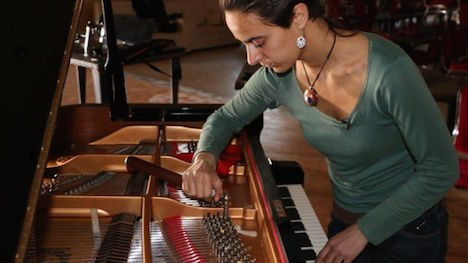 |
| Tuning |
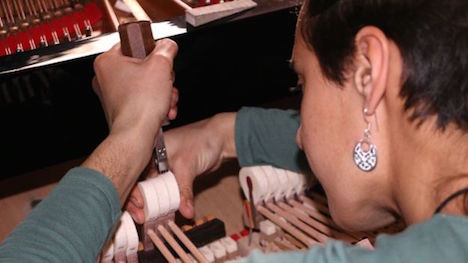 |
| Working on the hammers |
Assisted by two Palestinian apprentices, Bertrand meticulously replaced every one of the 230 strings, and 88 hammers and felts. They worked in the unusual surroundings of an ornate wedding hall alongside the ruined theatre - often plunged into darkness by Gaza's frequent power cuts.
This is a task that demands sensitivity as well as technical expertise. "Every piano has its personality," Bertrand says. "Even two brand new pianos built at the same time will sound different. That's why I say they have a soul."
In 10 days, the work was finished.
The moment was celebrated with a small concert in the wedding hall by pupils of Gaza's only music school, a branch of Palestine's Edward Said National Conservatory, and the territory's only professional piano teacher, Yelena Lidawi, a Russian who moved to Gaza 15 years ago. The music school has existed for seven years, discreetly hidden away inside the Gaza headquarters of the Palestinian Red Crescent. It operates only in the evenings but provides a rare space for music in a society where some reject it as haram - forbidden by God.
At the concert, the school's star piano pupil, Sara Aqel, aged 15, performed Beethoven's 19th sonata.
The teenager has already lived through three wars, seeing destruction all around her - and music, she says, has helped her and others deal with the strain.
"Music might not build you a house or give you your loved-ones back," she says. "But it makes you feel better, so that's why I just keep playing it."
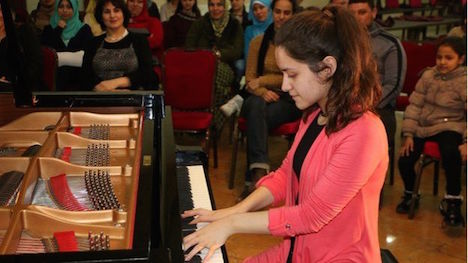 |
| Sara Aqel, aged 15 |
Lukas Pairon of Music Fund puts it more strongly. Music in Gaza, he says, "is a form of rebellion against being narrowly defined as living beings who only want the basic things - food, protection, security - who are only in survival mode."
The piano's owner, Saad Herzallah, who also owns the theatre and the leisure complex around it, has promised music school pupils will have access to the instrument. There will also be an annual fundraising concert. But regular events may be hard to organise until a permanent hall for the piano can be found. Much of the complex is in ruins and Herzallah has no immediate plans to rebuild.
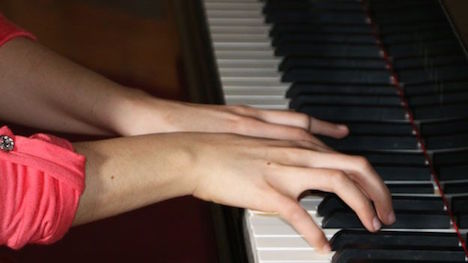 |
| Sara's hands |
In the long term, though, the man who discovered the piano is confident it will continue to be heard in Gaza.
"It hasn't been used because there were no musicians to play on it. But now we are going to teach a new whole generation," says Khamis Abu Shaaban.
"They will spread the idea that music is not haram… but really natural. You have music in your body. It's in your heart."
Source URL
|
 Print This Print This

|

